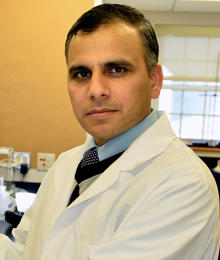An interview with Dr Madan Kharel
Dr Madan Kharel is Assistant Professor at the University of Maryland Eastern Shore, USA. His research involves exploring microbes that produce novel metabolites, and in this interview he tells us more about why the engineering of biosynthetic pathways is a significant development in the field of microbiology.

Tell us more about your research on novel products.
My research focuses on the discovery and development of anti-bacterial agents. I am interested in exploring microbes that produce novel metabolites and developing new analogues, through the engineering of biosynthetic pathways.
Why is this research important to microbiology?
Antibiotics discovered in the past century have increasingly become less and less effective with the emergence of antimicrobial resistance. Exploration of new antibiotics has become more important now than ever before. Inherent structural complexities found in many microbial natural products are a major barrier to synthetic modifications. Engineering of biosynthetic pathways offers viable means to develop rationally designed analogues, which is highly significant.
Why does microbiology matter?
Microbes are an integral part of the ecosystem. It is becoming more apparent that microbes play crucial roles in the optimal development of humans and the maintenance of health. Microbes are implicated in every aspect of our society; from food products to agriculture; diagnostic tools to treatments; and epidemics to therapeutics. Notably, we have explored only a tiny fraction of microbial potential as culture conditions, for the vast majority of microbes are still elusive, and a large number of biosynthetic pathways appeared to be silent in cultured organisms. Microbiology thus offers tremendous opportunities for new discoveries and solutions to problems the world facing today.


